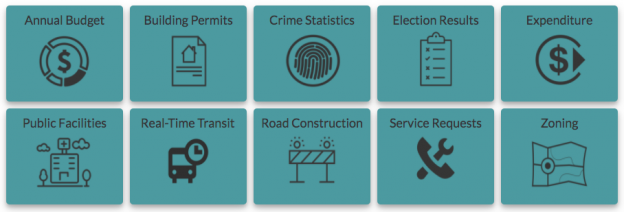
Geothink and the Center for Government Excellence (GovEx) at Johns Hopkins University launched a first-of-its-kind Open Data Standards Directory that identifies and assembles standards for open data shared by governments.
In many ways, a precondition to realizing the promise of open government data is the standardization of that open data. Open data standards ensure interoperability, establish benchmarks in assessing whether governments achieve their goals in publishing open data, and can better ensure accuracy of the data. Interoperability enables the use of off-the shelf software and can make it easier for third party developers to create one product that serves multiple locales. Our project aims to determine which standards for civic data are best to open up government data. We built an inventory of data standards and identified a set of metrics to evaluate those standards. Our goal is to inform civic open data providers about which standards to choose prior to implement and deter providers from standards that lock in users.
The Open Data Standards Directory can be found here: https://datastandards.directory/
On Wednesday, December 20 at 12:00 (EST), Geothink.ca hosted its fourth Geothink&Learn video conference session on the directory. It highlighted Geothink’s unique interdisciplinary perspective and included a myriad of ideas from our faculty, students and partners. (Catch a recording of the session along with a transcript of the question and answer session below.)
The convener of this session was Geothink Head Renee Sieber, an associate professor in McGill University’s Department of Geography and School of Environment. Speakers included Rachel Bloom, a project manager of Open Smart Cities in Canada at OpenNorth; Andrew Nicklin, GovEx Director of Data Practices; Nicolas Levy, a McGill University undergraduate student in Urban Systems and Geographic Information Science (GIS); and, Julia Conzon, who will join Employment and Social Development Canada (ESDC) as a Data Statistical Analysis Officer in January 2018.
A question and answer session followed after presentations concluded. Our four panelists briefly introduced their role in the project and then reflected on the the launch of the Open Data Standards Directory.
1. Do we need heterogeneity in data standards?
I’d like to think that certain data sets like zoning are relatively specific to cities. We don’t need to standardize everything. And, if you permit me to stand on the soapbox, standards are often driven by efficiency goals. Governments shouldn’t have as their ultimate goal efficiency, but effectiveness.
2. What are some potential risks of increasing interoperability?
Great question. I’ll answer it in a way that may not be so obvious. There are risks of exposing corruption or malfeasance. That may sound like a good thing. However 1. there may be no accountability regime that allows exposure to be acted upon. 2. The public doesn’t always understand the particulars of a city or a service. So oddness in reports in one city may not be odd at all in another. Not all cities operate the same but standards imply they do and the public doesn’t always have complete understanding of how they operate. The data doesn’t give enough metadata for understanding.
3. Can you share some examples of the roles of the people you interviewed within the city?
Hi An Turner – I spoke with open data leads when available. When cities didn’t have FTEs for their open data programs, I spoke to anyone within the City looking into adopting standard for their city’s open data. there was a variety of titles in those cases.
4. I may have missed it but was one of the indicators level of adoption? – sometimes the best standard does not catch on but one that has high penetration, resources and sustainable?
Yes, we are trying to track adoption rates (although there is more to do). But we do think it’s valuable to also look at how engaged the community is in creating and evolving the standards. For example, GTFS has very broad adoption, but it hasn’t really evolved too much in the past few years.
5. Thanks, Renee – I think that’s spot on, especially given Rachel’s note about making data useful instead of only interoperable.
Absolutely. I put a note in the chat–It’s also important to talk about semantic readability’s not enough that machines can digest the data. Non schema experts need to understand what’s in the schema. Building inspectors need to understand the schema too. That increases the legibility. But neither of these ensure utility.
6. Are the presenters aware of other directories for different sectors, I.e.beyond data used by cities? is there a directory of directories?
Not that I’m aware of. ISO comes the closest. Our focus was, as much as possible, on open open standards. You should know that many standards bodies don’t release the specs for their standards.
7. What is an example of global standards?
National census bureaus try to come up with global standards for demographics. Even these, a family, a household, an income are difficult to homogenize across countries.
8. This is a research/ methods question for us researching data standards visualization – specifically for Julia, what were some of the challenges to visualization from your experience on the project?
[Answered orally during the session.]
Download a PDF of this event to share.
When:
Wednesday, December 20, 2017 at 12:00 PM [NOW CONCLUDED]
Where:
https://zoom.us/webinar/register/WN_G3LxrpzxQAaikBMsaox9ZQ
After registering, you will receive a confirmation email containing information about joining the webinar.
Convener:
Renee Sieber
Moderator:
Drew Bush
Panelists:
 Renee Sieber: Open data standards ensure interoperability and reusability, establish benchmarks in assessing whether governments achieve their goals in publishing open data, and better ensure accuracy of the data. In many ways, a precondition to realizing the promise of open government data is the standardization of that open data. In this webinar we discussed what is required of standards and what constitutes good civic data standard.
Renee Sieber: Open data standards ensure interoperability and reusability, establish benchmarks in assessing whether governments achieve their goals in publishing open data, and better ensure accuracy of the data. In many ways, a precondition to realizing the promise of open government data is the standardization of that open data. In this webinar we discussed what is required of standards and what constitutes good civic data standard.
 Julia Conzon: As the site’s original developer, Julia discussed the research we conducted to understand the site’s users’ needs as well as how we designed and developed the site to account for our findings.
Julia Conzon: As the site’s original developer, Julia discussed the research we conducted to understand the site’s users’ needs as well as how we designed and developed the site to account for our findings.

Andrew Nicklin: Talked about the genesis of the site and where it may go in the future.
 Rachel Bloom: Discussed what informed the creation of the directory’s set of metrics. In addition, she will discuss the challenges of communicating the value of open data standards and their attributes to stakeholders.
Rachel Bloom: Discussed what informed the creation of the directory’s set of metrics. In addition, she will discuss the challenges of communicating the value of open data standards and their attributes to stakeholders.
 Nicholas Levy: If the Open Data Standards Directory hopes to grow through user contributions, a classification scheme must be devised to facilitate the querying of standards. A controlled vocabulary and a folksonomy are both considered for this purpose, but each comes with its own set of drawbacks.
Nicholas Levy: If the Open Data Standards Directory hopes to grow through user contributions, a classification scheme must be devised to facilitate the querying of standards. A controlled vocabulary and a folksonomy are both considered for this purpose, but each comes with its own set of drawbacks.